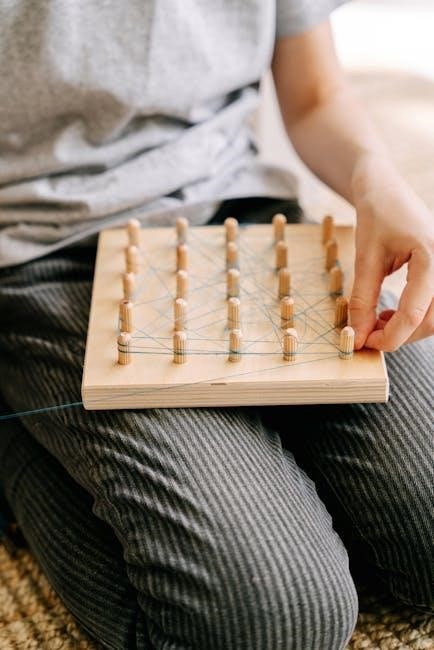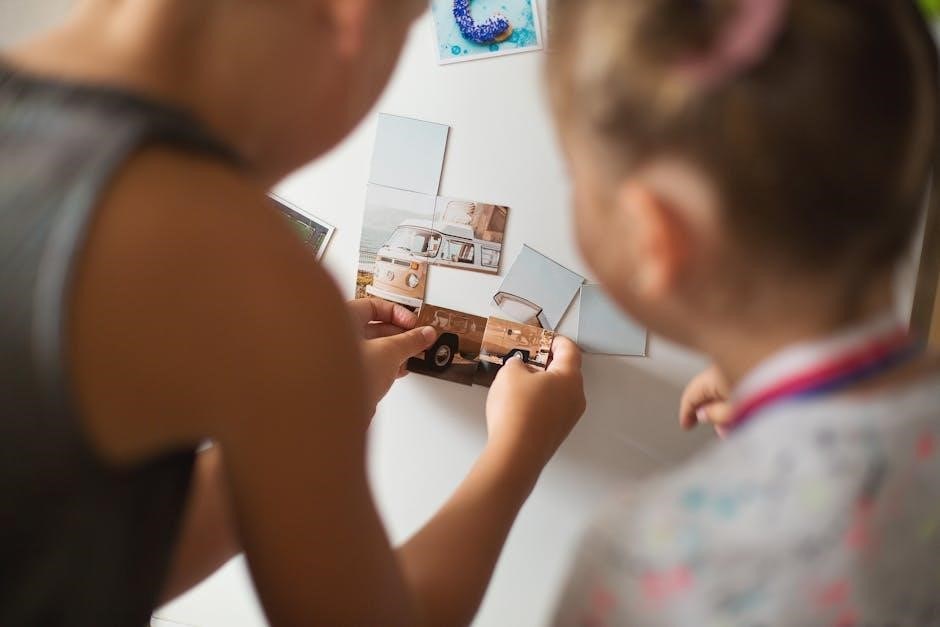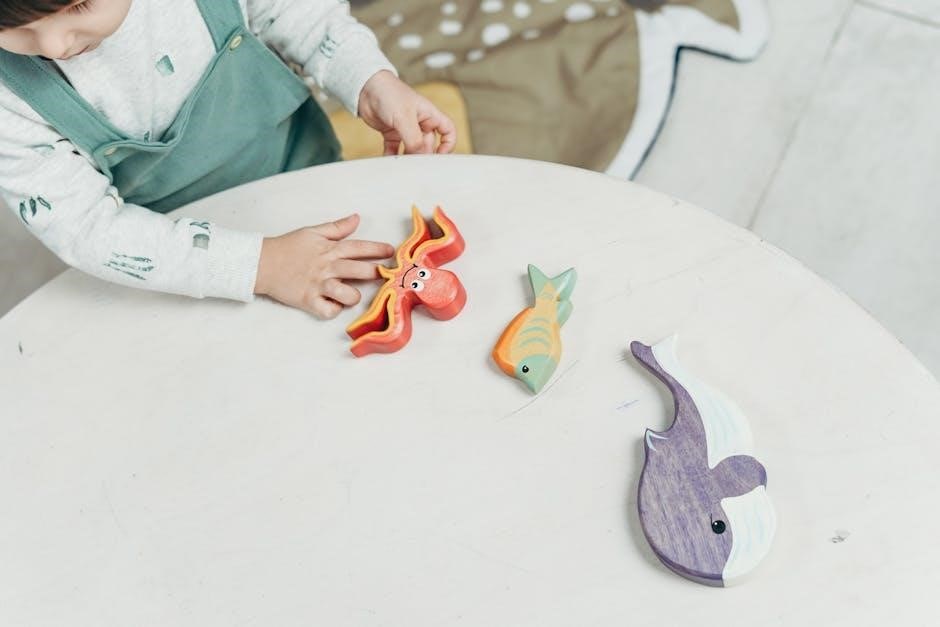
montessori syllabus pdf
Montessori Curriculum Overview
The Montessori curriculum offers a comprehensive approach to education, focusing on key areas like practical life, sensorial exploration, mathematics, language, and cultural studies․ It nurtures independence and prepares children for future success through hands-on learning․
Key Areas of Study
The Montessori curriculum encompasses five key areas of study designed to foster holistic development in children․ These areas include Practical Life, which cultivates independence and life skills; Sensorial Exploration, which refines the senses through engaging activities; and Mathematics, where hands-on learning brings mathematical concepts to life․ Language Development nurtures literacy skills, while Cultural Studies explores the world through various subjects․ Through repetition and practice within these areas, children develop a foundational understanding and master core competencies․ This comprehensive approach ensures a well-rounded education, preparing children to approach learning with curiosity and confidence, embodying the Montessori philosophy․
Practical Life
Practical Life activities in the Montessori curriculum focus on developing essential skills․ These activities promote independence, coordination, concentration, and a sense of responsibility, preparing children for everyday tasks․
Developing Independence and Life Skills
Montessori’s Practical Life area cultivates independence through purposeful activities․ Children engage in exercises like pouring, dressing, and cleaning, fostering self-reliance and fine motor skills․ These tasks instill a sense of order and responsibility, preparing them for real-world scenarios․
By mastering these skills, children gain confidence and a sense of accomplishment․ Practical Life activities promote concentration, coordination, and problem-solving abilities․ The Montessori environment encourages self-directed learning, allowing children to progress at their own pace, building a strong foundation for future learning and independence․ These activities are designed to mimic real-life scenarios․

Sensorial Exploration
The Montessori curriculum emphasizes sensorial exploration, refining children’s senses through hands-on materials․ Activities involve distinguishing colors, shapes, textures, and sizes․ This sensory-rich environment enhances perception and lays a foundation for abstract thinking․
Refining the Senses
Montessori sensorial materials are designed to isolate specific qualities like color, size, shape, texture, sound, and smell․ Children use these materials to discriminate and classify sensory experiences, developing their powers of observation and concentration․ Activities like the pink tower, brown stair, and color tablets help children refine their visual and tactile senses․ The sound cylinders and smelling bottles engage auditory and olfactory senses, respectively․
Through repeated exploration, children internalize sensory impressions, which forms a basis for later cognitive development․ This process cultivates a heightened awareness of their environment, fostering a deeper understanding of the world around them; The sensorial area is fundamental․
Mathematics
Montessori mathematics involves hands-on learning of mathematical concepts․ Children progress from concrete materials to abstract understanding, mastering core competencies through repetition and practice․ This method fosters a solid foundation in numeracy․
Hands-on Learning of Mathematical Concepts
The Montessori math curriculum emphasizes hands-on learning, allowing children to explore mathematical concepts through concrete materials․ These materials include golden beads, number rods, and geometric solids, providing a sensorial experience that aids understanding․ Through repetition and practice, children develop a foundational understanding of each material, gradually progressing from concrete to abstract thinking․ The curriculum covers areas such as number recognition, counting, addition, subtraction, multiplication, division, and geometry․ The use of manipulatives allows children to internalize mathematical principles at their own pace, fostering a deep and lasting comprehension․ This approach nurtures independent, confident learners well-prepared for future academic success․

Language Development
Montessori nurtures literacy skills through phonetic awareness, writing, and reading activities․ Children learn through hands-on materials, fostering self-expression and creativity․ Language is integrated across the curriculum to enhance communication skills․
Nurturing Literacy Skills
The Montessori approach to language development emphasizes a hands-on, multi-sensory experience that fosters a love of reading and writing․ Children begin by exploring phonetic sounds through tactile materials, gradually building towards reading comprehension and written expression․ Activities like sandpaper letters, movable alphabets, and language games are used to make learning engaging and effective․
The curriculum is designed to be child-centered, allowing children to progress at their own pace․ The goal is to nurture independent, confident learners who are well-prepared for future academic success․ Montessori education stimulates a nurturing environment for children ages 6 weeks-6 years․

Cultural Studies
Cultural studies in the Montessori curriculum expose children to geography, history, and science․ These explorations foster a global perspective and appreciation for diverse cultures, nurturing their understanding of the world around them․
Exploring the World
Montessori cultural studies introduce children to the wonders of the world through geography, history, and science․ Children learn about different countries, cultures, and customs, fostering a global perspective․ Hands-on activities, such as map-making and studying different landforms, bring geography to life․ History lessons explore timelines and significant events, sparking curiosity about the past․
Science activities cover various topics, from botany and zoology to physics and chemistry, encouraging children to investigate the natural world․ These explorations cultivate a sense of wonder and respect for the planet and its diverse inhabitants, broadening their horizons․ The Montessori approach nurtures a lifelong love of learning and exploration․

Montessori Materials
Montessori materials are designed for hands-on learning, enabling children to master core competencies through repetition and practice․ These materials cover practical life, sensorial, mathematics, language, and cultural studies, fostering a deep understanding․
Learning Through Repetition and Practice
In the Montessori method, learning through repetition and practice is fundamental․ Children engage with specially designed materials, allowing them to explore concepts repeatedly․ This hands-on approach fosters a deep, intuitive understanding․ Through consistent interaction, children master core competencies within each area of the Montessori curriculum․ This includes practical life, sensorial activities, mathematics, language development, and cultural studies․ Repetition builds a solid foundation, promoting confidence and independence․ This mastery prepares them for more advanced learning․ The Montessori materials provide a structured yet flexible environment․ Children learn at their own pace, reinforcing concepts through repeated use and exploration, ensuring lasting comprehension․
Montessori for Ages 3-6
For children aged 3-6, the Montessori method offers a comprehensive learning experience․ It focuses on holistic education, empowering curious mindsets through the core principles of the Montessori philosophy․
Comprehensive Learning Experience
The Montessori approach for ages 3-6 provides a comprehensive learning experience designed to foster independence and self-expression․ It emphasizes creativity and a child-centered approach to education․ Key areas include practical life skills, sensorial exploration, and hands-on math lessons, nurturing children’s natural curiosity․ Through repetition and practice, children develop a foundational understanding and master core competencies within each curriculum area․
Specifically designed for this age group, the curriculum offers an engaging learning experience, either in a homeschool or classroom setting․ It empowers children to approach learning with a curious mindset through the values and principles of the Montessori philosophy, preparing them for future academic success․
Montessori Teacher Training
Montessori teacher training is essential for guiding children using the Montessori Method․ Trained guides understand the curriculum’s intricacies, fostering independent learners prepared for future academic success through individualized instruction and careful observation․
Importance of Trained Guides
Trained Montessori guides are vital for the successful implementation of the Montessori curriculum․ Their expertise ensures children develop a foundational understanding through repetition and practice, mastering core competencies․ These guides follow the child’s individual progression, nurturing independent, confident learners․ They understand the intricacies of language development, mathematical understanding, and sensorial exploration․
With specialized training, guides can effectively create stimulating and nurturing environments where children thrive․ The Montessori approach emphasizes independence, self-expression, and creativity, and trained guides are equipped to foster these qualities․ They provide individualized guidance, preparing children for future academic success and a lifelong love of learning․